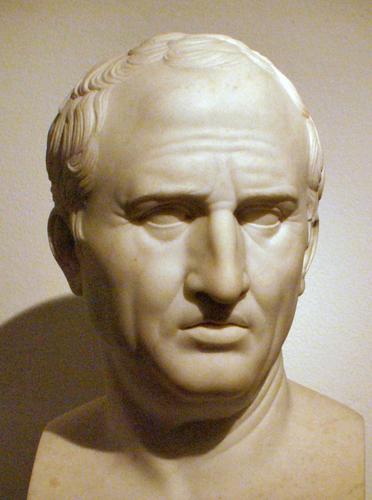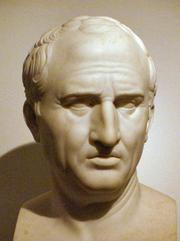Marcus Tullius Cicero (pronounced /ˈsɪsɨroʊ/; Classical Latin: [ˈkikeroː]; January 3, 106 BC – December 7, 43 BC) was a Roman philosopher, statesman, lawyer, political theorist, and Roman constitutionalist. He came from a wealthy municipal family of the equestrian order, and is widely considered one of Rome's greatest orators and prose stylists.
He introduced the Romans to the chief schools of Greek philosophy and created a Latin philosophical vocabulary (with neologisms such as humanitas, qualitas, quantitas, and essentia) distinguishing himself as a linguist, translator, and philosopher. An impressive orator and successful lawyer, Cicero thought that his political career was his most important achievement. Today, he is appreciated primarily for his humanism and philosophical and political writings. His voluminous correspondence, much of it addressed to his friend Atticus, has been especially influential, introducing the art of refined letter writing to European culture. Cornelius Nepos, the 1st-century BC biographer of Atticus, remarked that Cicero's letters contained such a wealth of detail "concerning the inclinations of leading men, the faults of the generals, and the revolutions in the government" that their reader had little need for a history of the period. Cicero's speeches and letters remain some of the most important primary sources that survive on the last days of the Roman Republic.
During the chaotic latter half of the first century B.C. marked by civil wars and the dictatorship of Gaius Julius Caesar, Cicero championed a return to the traditional republican government. However, his career as a statesman was marked by inconsistencies and a tendency to shift his position in response to changes in the political climate. His indecision may be attributed to his sensitive and impressionable personality; he was prone to overreaction in the face of political and private change. "Would that he had been able to endure prosperity with greater self-control and adversity with more fortitude!" wrote C. Asinius Pollio, a contemporary Roman statesman and historian. Cicero became an enemy of Mark Antony, attacking him in a series of speeches. He was proscribed an enemy of the state by the Second Triumvirate and subsequently murdered in 43 BC.
Source: Wikipedia
2922 works Add another?
![]() Sorted by:
Most Editions
|
First Published
|
Most Recent
|
Top Rated
|
Reading Log
|
Random
Sorted by:
Most Editions
|
First Published
|
Most Recent
|
Top Rated
|
Reading Log
|
Random
Showing all works by author. Would you like to see only ebooks?
Cicero
×Close
Subjects
Early works to 1800, Speeches, addresses, etc., Latin, Correspondence, Oratory, Latin Authors, Ethics, Statesmen, Old age, Friendship, Cicero, marcus tullius, Translations into English, Latin language, Latin language materials, Politics and government, Ancient Rhetoric, Philosophy, Speeches, addresses, etc., Ancient Oratory, Political science, History, Sources, Readers, Criticism and interpretation, Philosophy, ancient, Conduct of lifePlaces
Rome, Italy, Rome (Empire), Sicily (Italy), Antwerp, Catilina, Happiness, Italie, Rome (Italy), Römisches Reich, Turkey, United States, Washington (D.C.)People
Marcus Tullius Cicero, Titus Pomponius Atticus, Catiline (ca. 108-62 B.C), Gaius Verres (1st cent. B.C), P. Cornelius Scipio Aemilianus Africanus minor (185 or 184-129 B.C), Scipio Africanus (ca. 236-183 B.C), Titus Annius Milo (d. 48 B.C), Gaius Rabirius Postumus, Marcus Caelius Rufus, Marcus Junius Brutus (85?-42 B.C), Quintus Tullius Cicero, Marcus Antonius (83?-30 B.C), Aulus Licinius Archias (b. 120 B.C), Cicero, Marcus Claudius Marcellus (d. 45 B.C), Marcus Junius Brutus (85 B.C.?-42 B.C), A. Caecina, Gaius Verres (active 1st century B.C), Gnaeus Plancius, James Tunstall (1708-1762), Lucius Cornelius Balbus, Publius Cornelius Sulla (d. 45 B.C), Publius Vatinius (fl. 59-47 B.C), Scipio Africanus (approximately 236 B.C.-183 B.C), Julius CaesarTime
Conspiracy of Catiline, 65-62 B.C., 265-30 B.C., 510-30 B.C., 53-44 B.C., Mithridatic Wars, 88-63 B.C., Republic, 265-30 B.C., 1546, 510-30 av. J.-C, 510-30 av. J.-C. (République), Ancient Rome, Civil War, 43-31 B.C., Early works to 1800, Republic, 510-30 B.C., Republic, B.C. 265-30, To 1282, To 1500, addressed to Marcus Herrenius, c 86 BC treatise on RhetoricID Numbers
- OLID: OL28743A
- ISNI: 0000000139322910
- VIAF: 78769600
- Wikidata: Q1541
- Inventaire.io: wd:Q1541
Links (outside Open Library)
Alternative names
- Marcus Tullius Cicero
- M. Tullius Cicero
- Ciceron
- Marco Tulio Ciceron
- M Tvlli Ciceronis
- Cicéron
- Marcus Tullius Cicéron
- Cicéron.
- Marcus Tullius Marcus Tullius Cicero
- Cicero Marcus Tullius
- CICERO
- Ciceró
- CICERON
- Ciceron Ciceron
- CICÉRON
- Marco Tulio Cicerón
- Cicerón
- . Cicéron
- Cicerón -
- Marcus Tullius Cicero Cicéron
- MARCO TULIO CICERON
- Cicerón Marco Tulio
| April 24, 2023 | Edited by Tom Morris | merge authors |
| April 24, 2023 | Edited by Tom Morris | merge authors |
| December 21, 2022 | Edited by Tom Morris | merge authors |
| February 19, 2021 | Edited by Tom Morris | merge authors |
| April 1, 2008 | Created by an anonymous user | initial import |



